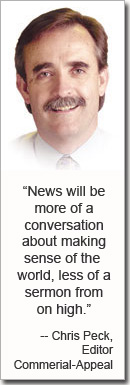May 31, 2006
The Conversation About Change Has Changed

![]() "News will be generated by the people who are chosen, not the chosen people."
"News will be generated by the people who are chosen, not the chosen people."
![]() "News will be framed according to your social networks, your age and your tribe."
"News will be framed according to your social networks, your age and your tribe."
![]() "News will rely on the wisdom of the many, not the insight of the few, with journalists being knowledge leaders."
"News will rely on the wisdom of the many, not the insight of the few, with journalists being knowledge leaders."
Those aren't my words, although I agree with them. Neither are they thoughts of any other newspaper industry outsider, like Jarvis or Rosen or Gillmor, all advocates for new forms of journalism to meet the demands of this new age of media.
As you've already guessed because of the accompanying illustration, Chris Peck, editor of the Commercial Appeal in Memphis made those statements in his weekly column (reg. req.).
Various people in and out of newsrooms have been using the "news-is-a-conversation" mantra for a couple of years, but when it comes off the keyboard of a mainstream editor, albeit one known for his thoughtfulness about the profession and passion for good journalism, then I say a tipping point has been reached.
Coming on the heels of Dave Zeeck's speech to ASNE calling for his fellow editors to amp up the leadership they are paid to provide, Peck's manifesto for the future of news indicates a marked shift in the conversation about changing newspapers: The patient has swallowed the bitter pill. It's time to talk about remedies.
The conversation must move from its defensive posture of preserving current newsroom culture and practices to constructive questions that lead to definable goals for change and long-term editorial strategies supported by a commitment to invest in and develop the journalists of the future.
At the APME convention in 2005, Peck, after hearing a panel describe a laundry list of new types of journalism for the future, commented: We need "different brains" and different skills in the newsroom to do those things. Where are we going to get them? In reply I wrote:
"The answer, of course, is we have to grow them - through strategic training, through ongoing learning, through the same sort of professional reinvention other industries have sustained. We must retool the news factory. [Read: Rethinking the News Factory (Again).] The newspaper industry, however, is a training Scrooge, investing on average only 0.7 percent of payroll in professional development, only a third the national average. It has underspent its way into a workforce that is under-prepared for cultural change or professional reinvention. All the good talk and assembled panels about change will amount to naught unless news managers put bodies and dollars into training - about technology, about audience, about communication and collaboration, about leadership." [Read: ASNE to APME: What Happened in Six Months?]
Few newspapers have definable goals for change. Many editors talk about their desire to attract younger readers, to produce brighter writing or to "converge" their newsrooms. Sadly, though, most don't have a true strategy for how to accomplish these things.
Their goals are fuzzy (what does "better writing" mean?) and therefore easily misunderstood (and therefore undermined) by middle-management and staff; their goals are not backed up by resources (moving the bodies to match the goals); their goals don't have measurable outcomes (how much "better writing" do you want? And from whom?).
The conversation must move from the recognition that change is necessary to how do newspapers acquire the tools to accomplish it. What strategies are working at leading-edge papers? What are common obstacles in all papers? What unique challenges does your newsroom have? What are your paper's strengths and weaknesses in facing change, and how can you (and your staff) enhance the former and minimize the latter? What skills does a newsroom leader like Peck need to lead change? What skills does his staff need to assist in that leadership and execute the plan?
The conversation must move from warnings about the industry's arguable doom to developing solutions to the ailments. The Readership Institute is using its web site to display examples of successful change and started a blog to continue that conversation. Go there. Read.
The conversation must move from stagnation to transformation. Yes, newspapers have dug a deep hole for themselves by sitting out (for the most part) the first decade of the digital revolution. But the great news about being a journalist in a dynamic environment is that change is constant so it's always possible to ride the next turn of the wheel.
Peck set two goals for himself other editors should emulate. He wrote (emphasis added):
"First, to work as a translator for my news organization. To help my fellow journalists look ahead to the emerging news ecology and 'take steps now' to adjust our daily work and planning to this new ecology."Second, to strive to be on the leading edge of the transformation. To keep learning about what roles, what jobs 21st-century news organizations are being asked to fill even as the core values of journalism are preserved."
The first is about leadership. The second is about continual learning, both personal and institutional. Both are good conversations to have.
Tags: Journalism, Newspapers, Media
Posted by Tim Porter at May 31, 2006 11:57 AMChange and Adjust - two of the most difficult words for many to adopt into their way of performing.
Posted by: drabin on June 2, 2006 10:00 PM